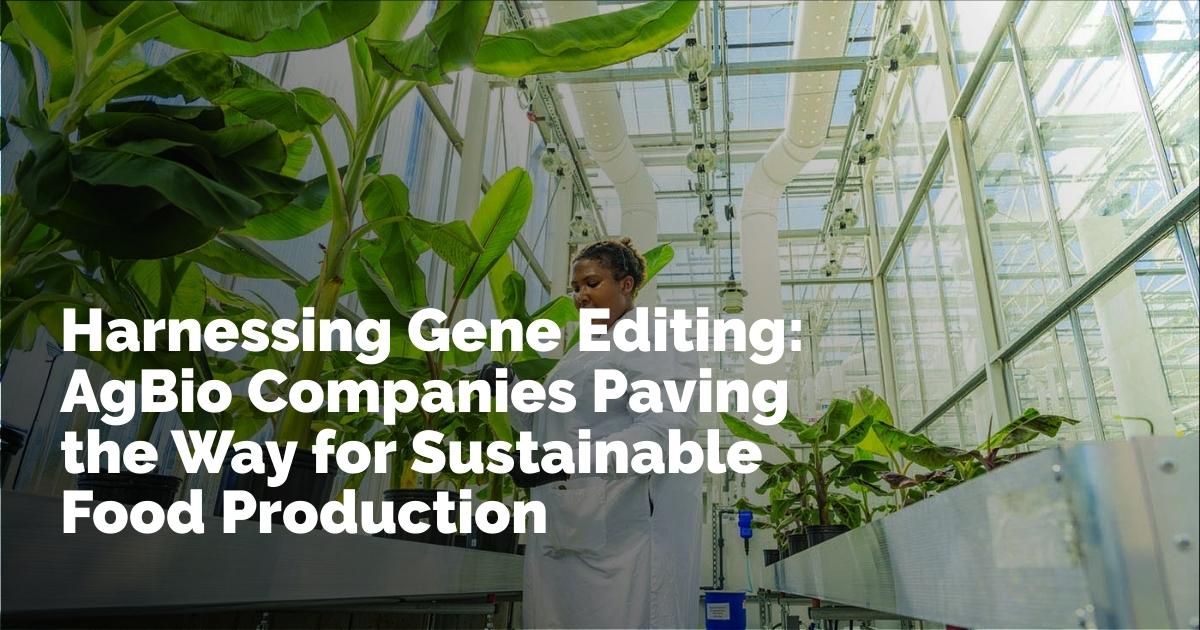AgBio Companies Embrace Gene Editing for a Stronger Food Future
In recent years, gene editing has emerged as a revolutionary tool for agricultural biotechnology companies. By leveraging advanced editing techniques, these companies aim to transform farming practices and secure a more resilient and abundant food supply. In this expansive exploration, we delve into how gene editing is reshaping the future of food with a focus on combating diseases, improving crop yields, and addressing ecological challenges.
The Cavendish Banana Threat
At the heart of the gene editing revolution is the pressing challenge faced by the Cavendish banana, a staple fruit threatened by Fusarium Tropical Race 4 (TR4). This destructive fungus attacks the plant's vascular system, posing a serious risk to global banana production. To combat this threat, Elo Life Sciences, in collaboration with the agricultural multinational Dole, employs a proprietary gene editing platform to develop resistant banana varieties without compromising their iconic taste.
Evolution of Gene Editing Technologies
Gene editing technologies have been instrumental in enhancing agricultural products for over two decades. One of the pioneering methods, Transfer DNA (T-DNA), involved using Agrobacterium tumefaciens, a bacterium that transfers genes to plants. However, as Julien Curaba, PhD, Chief Scientific Officer at Eremid Genomic Services, explains, T-DNA presents challenges due to its unpredictable gene insertion. This has paved the way for more efficient technologies like CRISPR, which have gained popularity for their precision in editing both plant and animal genomes.
CRISPR's transformative impact is evident in developments such as Genus's creation of CRISPR-edited pigs resistant to porcine reproductive and respiratory syndrome, a disease that has devastated pig populations. Companies like Elo Life Sciences and Inari are now leveraging CRISPR and similar techniques to sustainably enhance food crops.
Accelerating Gene Editing with AI
Recognizing the urgent need for faster crop development in the face of climate change and emerging pathogens, companies like Inari are turning to artificial intelligence (AI) for support. Catherine Feuillet, PhD, Inari's Chief Scientific Officer, emphasizes the importance of AI in revolutionizing plant breeding. Traditional breeding demands years of work, but with CRISPR and multiplex gene editing capabilities, Inari is expediting the process, focusing on staple crops like soybean, corn, and wheat.
With modern sequencing instruments generating vast amounts of data, the integration of AI allows scientists to predict and design gene edits more effectively. Inari's proprietary platform not only identifies causal gene sequences impacting plant performance but also implements multiplex editing to address complex agricultural challenges. This innovative approach enhances crop yield and resource efficiency, enabling sustainable agricultural practices with reduced environmental impact.
Urgent Needs in Crop Improvement
The urgency to develop resilient, high-yield crops is driven by the looming threats to global food systems from climate change and emergent diseases. Feuillet echoes the sentiment that waiting a decade or more for improved crop varieties is no longer feasible. By employing computational modeling in tandem with gene editing, Inari can rapidly iterate and refine plant genetics. The company's initial focus is on boosting plant yield, followed by improving resource efficiency in subsequent gene editing phases.
Addressing Genome Complexity
The challenge of working with the large, complex genomes of plants cannot be overstated. Inari is investing heavily in generating the necessary data to train AI models to prioritize gene candidates for editing. The comparative lack of data on plant genomes relative to human genomes presents a significant hurdle. Unlike animal genomes, plant genomes, such as the palaeopolyploid soybean, exhibit extensive duplication, complicating the task of gene editing.
To overcome these challenges, Inari's team includes scientists from diverse backgrounds, including drug discovery, who are dedicated to uncovering new insights into plant genomes. This multidisciplinary approach not only aids in guiding gene editing decisions but also informs future data collection and validation strategies.
Rescuing Endangered Crop Varieties
Elo Life Sciences' mission centers around safeguarding beloved fruits and vegetables from extinction, addressing issues such as climate change that threaten diverse plant species. Matt DiLeo, PhD, Head of R&D at Elo, highlights the potential of gene editing to make targeted genome alterations that can dramatically improve plant resilience.
Elo's unique approach involves a proprietary gene editing technology that predates CRISPR, offering certain advantages due to its protein-based framework. This allows Elo to address a broader range of traits and maintain proprietary control over its intellectual property, crucial for collaborations like their work with Dole on TR4-resistant banana cultivars.
Field Trials and Future Prospects
For agbio companies, gene-edited crops must undergo rigorous field testing to confirm their intended traits and benefits. Feuillet considers CRISPR not just an innovation, but an acceleration of breeding—a tool with the potential to revolutionize agriculture just as much as medicine.
Elo has already conducted extensive greenhouse tests on edited banana variants and is now progressing to larger field trials in Latin America to assess their resistance against TR4. The company also participates in partnerships to enhance crops like cassava, crucial for subsistence farming in diverse regions.
The Global Impact of Gene Editing
As the world faces mounting food security challenges, gene editing stands poised to play a pivotal role in ensuring a sustainable and abundant food supply. From bananas to soybeans, and beyond, the precision of gene editing and its integration with AI offer promising solutions to bolster crop resilience, improve yields, and navigate the ecological complexities of modern agriculture.
Gene editing technologies, powered by innovative companies like Inari and Elo, are not just transforming crops—they are reshaping the very landscape of global food production. As these technologies mature and adapt, their potential to positively impact consumer health, environmental sustainability, and economic viability will continue to grow, heralding a new era in agriculture.
출처 : Original Source

